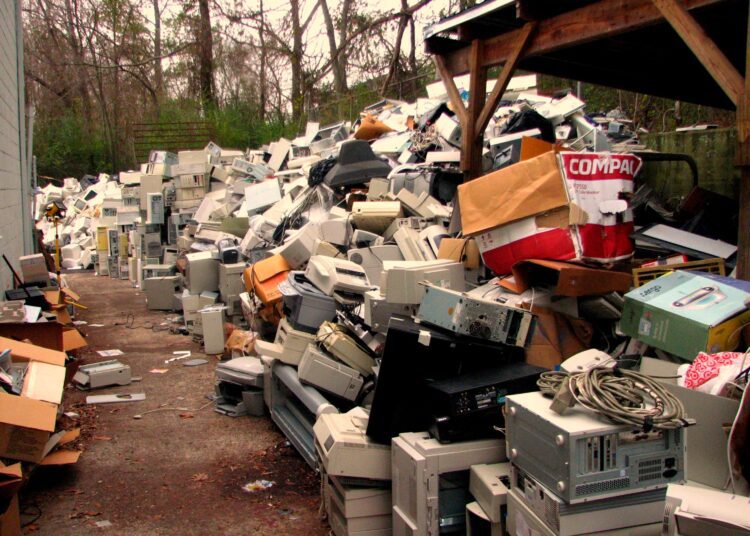When you are looking for something in a drawer, you may come across an old smart phone, set aside in favour of a newer model.
You may also have that old laptop that is collecting dust somewhere with no enough RAM to update. Your current smart phone, tablet or laptop may be destined to join them in the corner as soon as new tech hits the market. “So, how can you safely discard your old hardware?” E-Tadweer app can be the solution.
With Egyptians generating 90,000 tonnes of e-waste a year, the Ministry of Environment recently launched a campaign for ‘Safe Disposal of Electronic Waste’ through the new E-Tadweer app.
In order to promote the app, Egyptian Ministry of Environment Yasmeen Fouad announced on June 22 the launch of a media campaign to raise public awareness of the use of the app as a way to dispose of electronic waste safely.
Actually, a television advertisement is being screened these days across different satellite channels encouraging people to safely discard their unwanted electric devices through the app.
It has gone viral on social media. E-Tadweer app allows users to get rid of their e-waste at any of their partners’ outlets and gain incentives in the form of discount vouchers that can be used in purchasing electrical appliances,” the minister said.
The government has plans for an electronic waste system and seven electronic waste recycling factories have been opened, the minister said, adding that work is underway on five more.
For the first phase of the campaign, devices such as laptops, PCs, chargers, cameras, video games, mobile phones and small computer screens are collected.
Phase two involves the collection from users’ homes of large household appliances such as washing machines, refrigerators, stoves and TV screens.
“The campaign is meant to reduce health concerns that could ensue from electronic waste, create job opportunities and offer tangible examples for green and circular economy,” said Tariq Al-Arabi, Director of the Medical and Electronic Waste Management Project at the Ministry of Environment.
The private sector is the largest generator of e-waste, followed by households and then the government, he said, adding that the waste generated by the private and government sectors have policies and laws applied to them, so their waste must be handed over to an officially designated factory for recycling e-waste.
“However, collecting electronic waste generated from households has been one of the challenges of managing e-waste over the past years as it is collected by the informal sector and ends up in a landfill or it is kept in homes,” Al-Arabi said.
So, E-Tadweer app helps to overcome this problem as it creates a sustainable mechanism for collecting e-waste from individuals while providing them with economic incentives so that it does not end up in the hands of the informal sector, which does not follow any environmental standards in dealing with that waste.
“With the pace of new technology rendering new models of electric devices every year, e-waste recycling is an industry that is guaranteed to grow. Moreover, the optimal utilisation of e-waste in this nation can have its
great economic advantages,“ Magdi Allam, the Secretary of the Union of Arab Environmental Experts , told this newspaper.
He explained that at corporate level, old hardware is usually sold as e-waste, carted off or buried in a landfill somewhere. At household level, the average family just calls the bawab (doorman) to take away the big items such as TVs or refrigerators and the smaller items are just thrown away or stored among piles of other
unwanted things.
“It is a wasted opportunity for a multibillion dollar industry. Recycled and refined e-waste yields valuable metals such as gold and copper, as well as other raw materials that can feed local industry or become a lucrative export,” Allam said.
This is a very important industry around the world, and Egypt has a lot of potential given its consumption-oriented economy,” Allam said, adding that Egypt can be a major hub for North Africa and Europe to recycle their e-waste and then re-export the reclaimed materials.






Discussion about this post